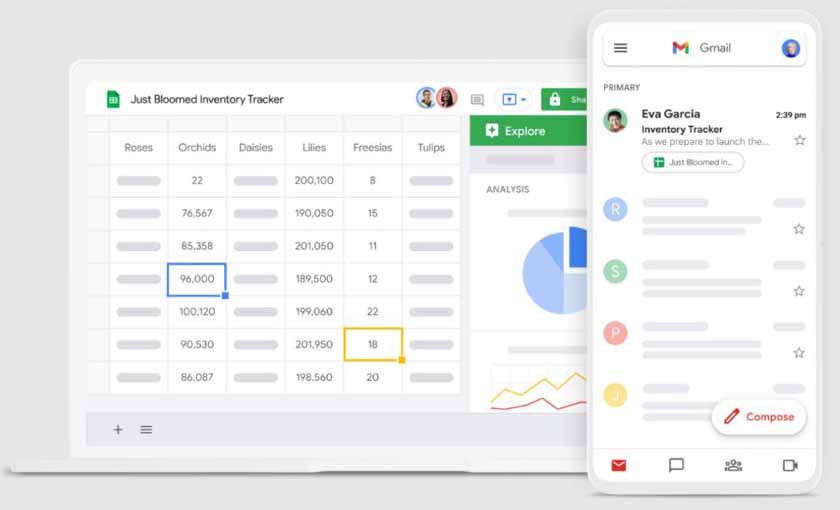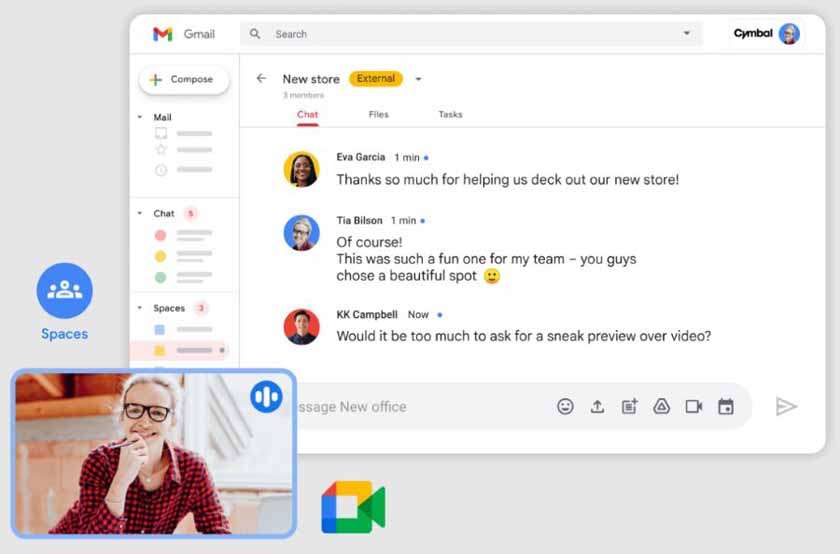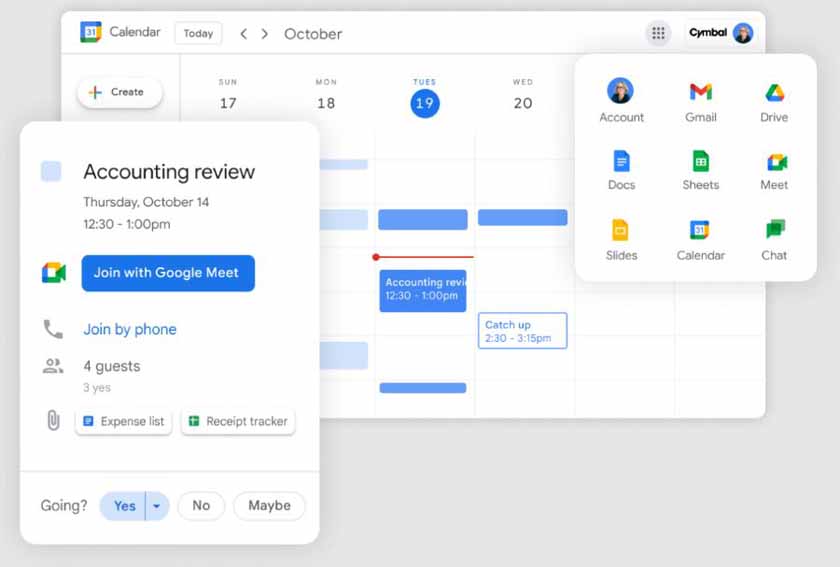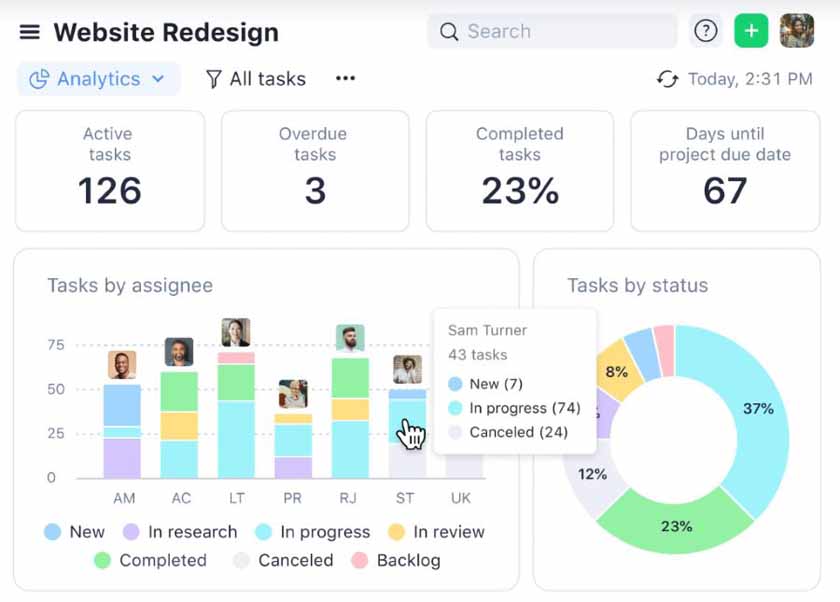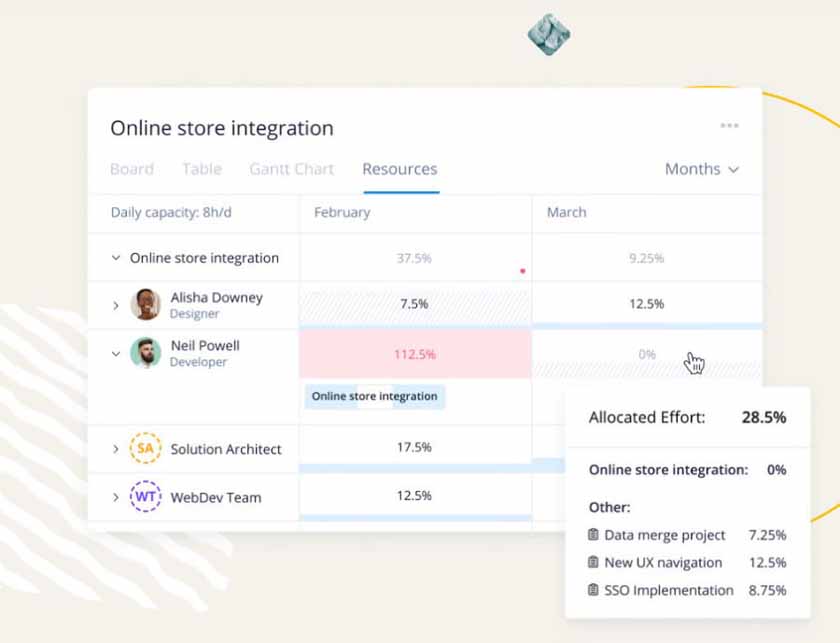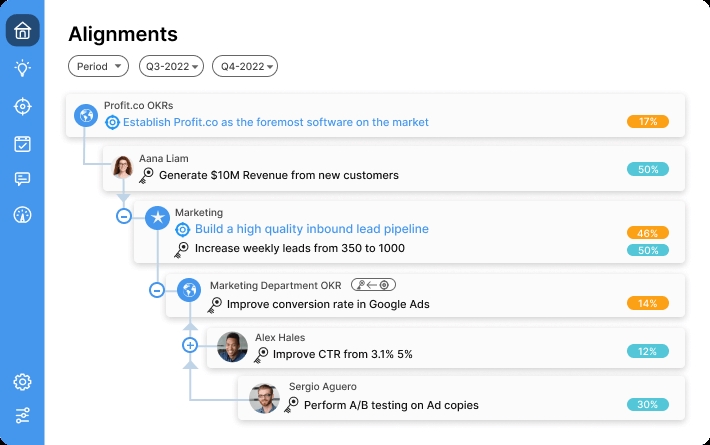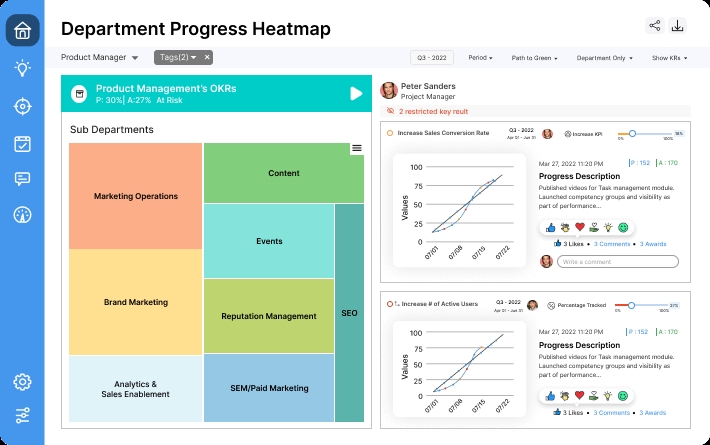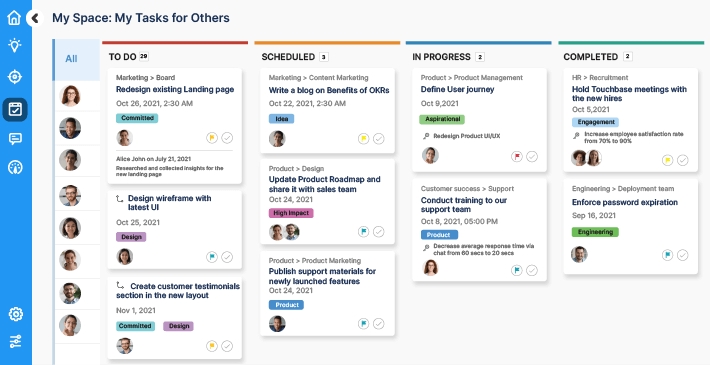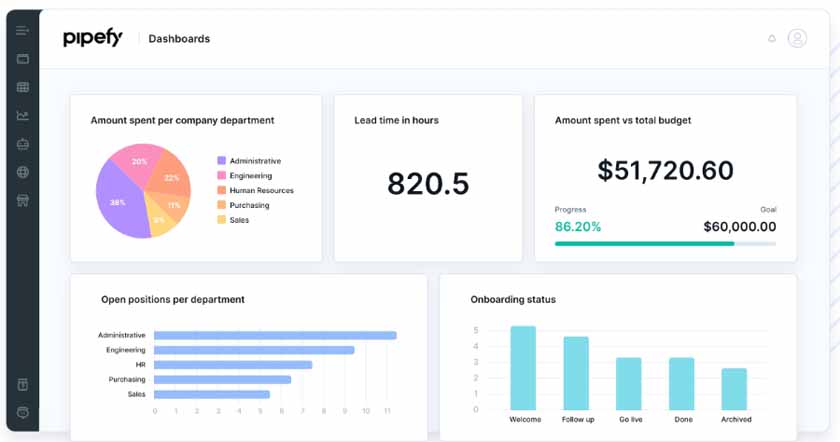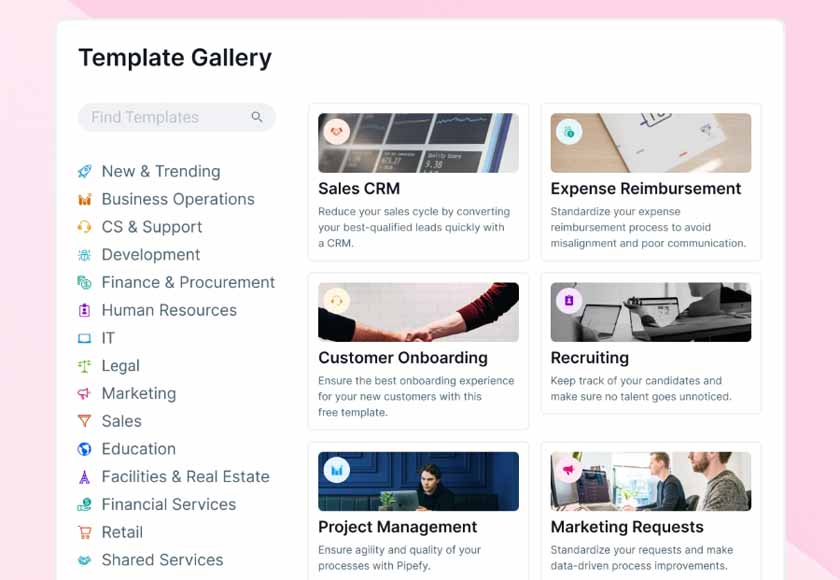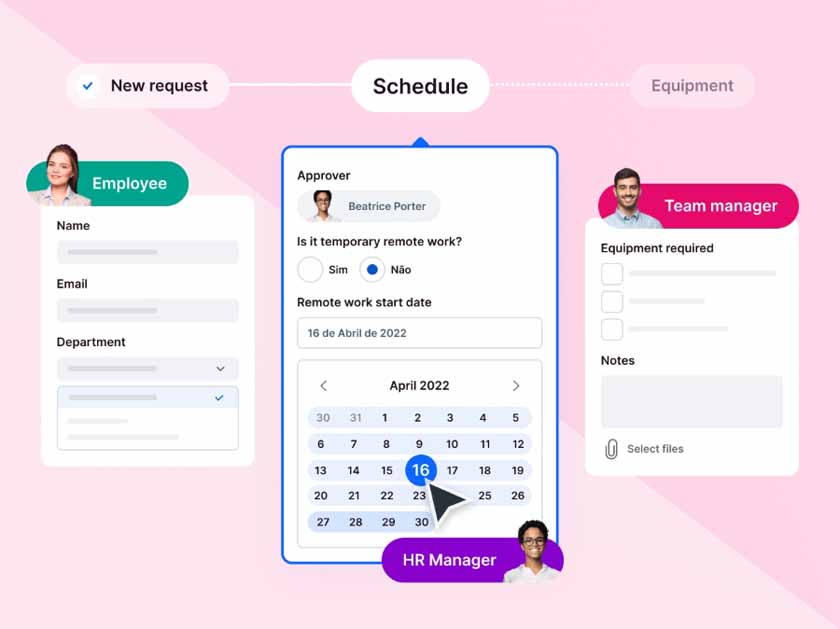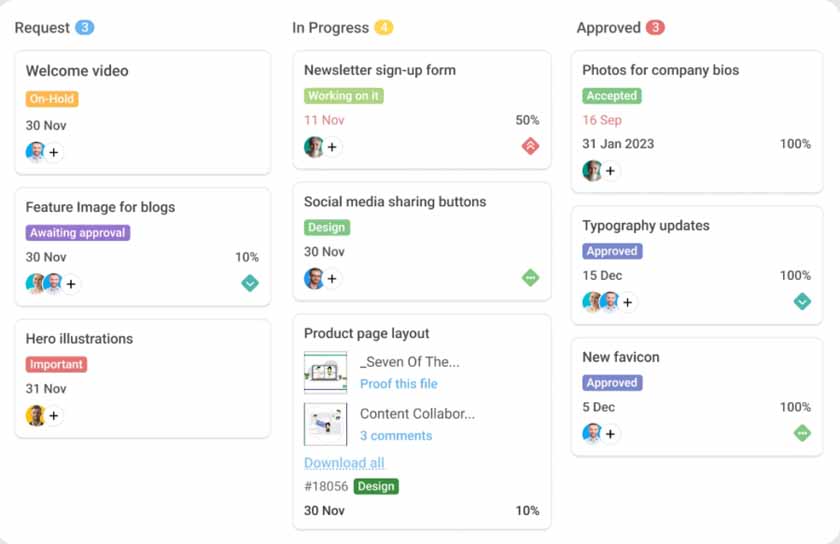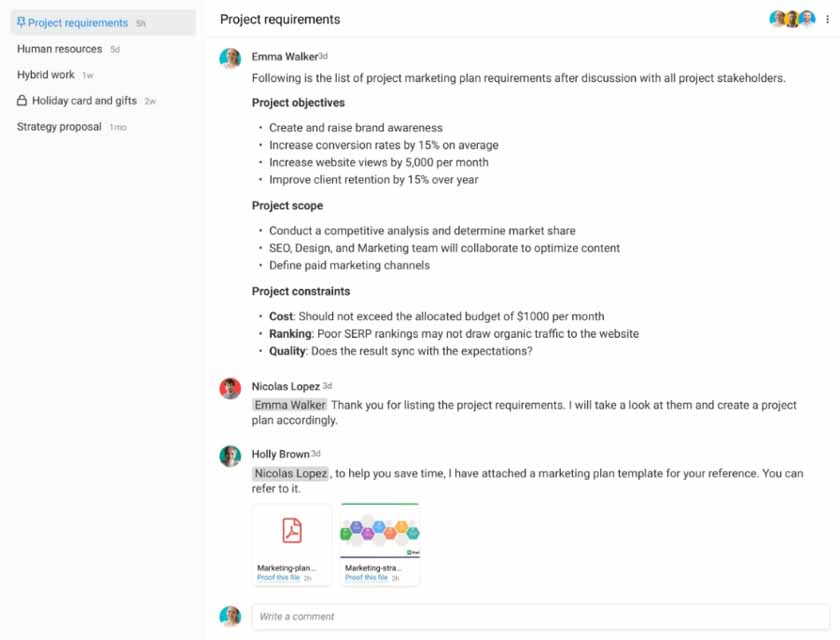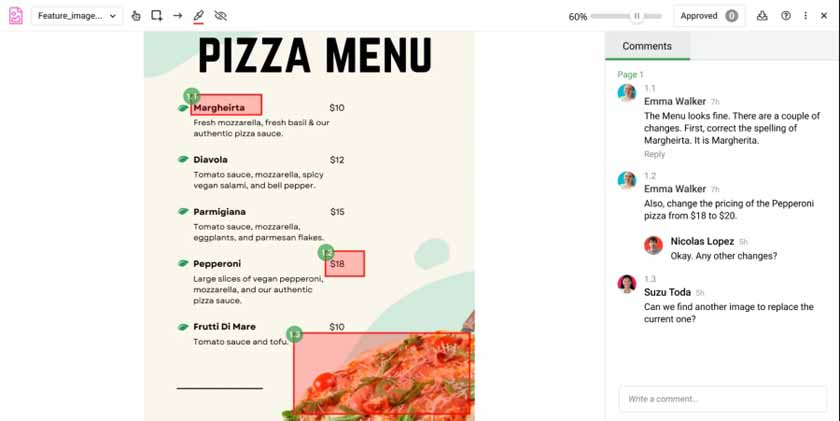Customer relationship management (CRM) software is used to organize lead information, track sales opportunities, and collaborate with team members on deals and tasks. While traditional CRM products such as Salesforce and HubSpot are excellent for managing sales-related operations, some teams don’t need the advanced automation, reporting, and communication tools in these products. In that case, CRM alternatives for tracking prospects and deals are ideal.
We’ve reviewed dozens of software that act as substitute CRM options and narrowed them down to our top nine recommendations:
- Most intuitive CRM replacement with prebuilt CRM templates: Trello
- Excellent all-around project management and collaboration tool: ClickUp
- Recommended for teams using Google apps: Google Workspace
- Best work management tool with a spreadsheet interface: Smartsheet
- Great CRM alternative with marketing capabilities: Airtable
- Solid option for project management with time tracking: Wrike
- Ideal for Objectives and Key Results (OKR) tracking: Profit.co
- Good for business process automation: Pipefy
- Top tool for resource management: ProofHub
Best CRM Alternatives Compared
Provider | Starting Monthly Price* | Free Plan? | Our Rating Out of 5 |
|---|---|---|---|
$6* | ✕ | 4.85 | |
$5* | ✓ Unlimited users | 4.83 | |
 | $6 | ✕ | 4.74 |
$9* | ✓ One user and two editors | 4.65 | |
$10* | ✓ Five users | 4.63 | |
$10.00 | ✓ Unlimited users | 4.63 | |
$9* | ✓ Five users | 4.50 | |
$23* | ✓ Five users | 4.48 | |
$45 Unlimited users | ✕ | 4.31 | |
*Based on monthly price per user, billed annually; monthly billing is available for slightly higher rates.
Trello: Best for Prebuilt CRM Templates

Pros
- Free plan for unlimited users
- Offers built-in CRM board templates
- Easy-to-use tasks automation capabilities
Cons
- Does not have reporting or analytics features outside of the dashboard
- Custom data fields require paid plan
- No dashboard view until you subscribe to the Premium plan
- You’re a small sales team needing a simple tool for managing leads and accounts: Trello features drag-and-drop Kanban boards that are very easy to use, even for beginners. You can add contacts as cards, use labels to prioritize leads, and move cards to the next column as the relationship progresses.
- You’re a freelancer or startup looking for a free CRM alternative: Trello offers a free plan that allows you to create up to 10 boards per team. It also offers low-cost paid plans that offer a ton of value with unlimited storage and advanced checklists.
- You are an agile team that handles complex projects: Trello’s Kanban boards are more suited for projects with tasks that go through a linear projection. It does not allow you to add subtasks or create roadmaps.
- Alternative: ClickUp offers 15-plus types of project and timeline views, including Gantt, Mind Map, and calendars. You can also visualize your team’s capacity and get an aggregated view of all your team’s activities across a specific location or project type.
- You are looking for out-of-the-box reporting and analytics tools: Unfortunately, Trello does not allow users to view their team performance and actionable insights. You can only access reporting tools through its integrations.
- Alternative: Smartsheet offers dashboards and reports across all of its plans. It lets you view historical data to spot trends and provides you with real-time analytics to visualize team performance.
Trello Pricing Plan & Overview*
*Pricing is based on annual billing on a per user, per month breakdown. Monthly billing is also available for a higher cost. Pricing is reflected at the time of this publication. We update pricing information regularly, but we encourage readers to check current pricing here.
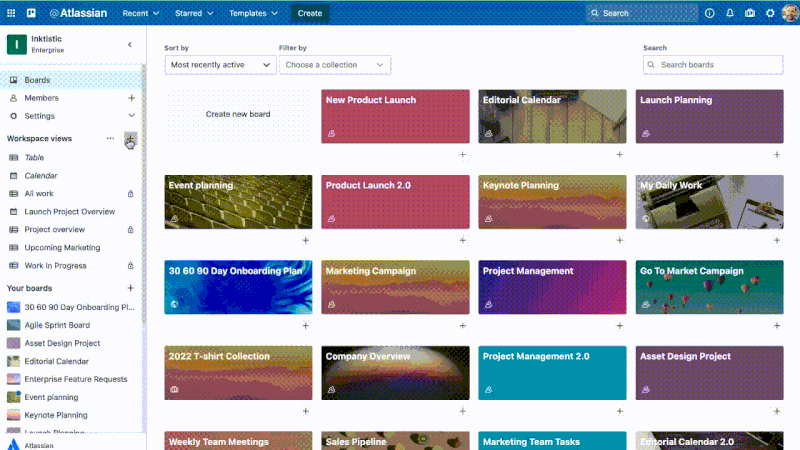
Customized Workspace views (Source: Trello)
Our Expert Opinion
Using Trello as a CRM is a great alternative for costs, integration options, and simplicity. You can use its boards, cards, and workspaces to manage leads and projects. Its power-up Crmble feature allows you to use prebuilt CRM templates and turn your board into a CRM with pipeline management, lead tracking, and sales dashboard funnel and revenue reporting. It also has hundreds of integration options with popular software like Google Drive, Twitter, and Mailchimp.
ClickUp: All-around Project Management & Collaboration Tool

Pros
- Free plan supports unlimited users, unlimited tasks, and custom views
- Has more than 15 project view options, including Gantt charts and Mind Maps
- Highly customizable workflows, views, and dashboards make it suitable for managing complex projects
Cons
- Steep learning curve due to high customizability
- Storage under the free plan is limited to 100MB
- Time tracking is available only from Business tier and up
- Your team uses Agile methodologies: ClickUp has Agile project management features, such as dashboards, templates, and sprint tools. This makes it a great option for teams that practice Agile development processes.
- You are an organization with a unique set of workflows: ClickUp boasts high customization capabilities, making it perfect for organizations with unique workflows, like software and marketing teams. You can use its whiteboard to visually brainstorm for campaigns and deliverables, and utilize visual roadmaps to align all teams working on a single product or project. Plus, you can collaborate on strategic roadmaps, capture product requirements, and more with ClickUp Docs.
- You are a team leader needing advanced sales reporting and analytics tools: ClickUp makes it easy for you to generate, pull, and customize real-time reports. It provides insights into team performance, team capacity, and goal progress.
- You need low-cost time tracking features: You can track time spent on various project tasks by labeling them as billable hours. However, this feature is only available starting from the Business tier.
- Alternative: ProofHub offers project templates with time tracking starting with its Essential plan, which supports an unlimited number of users.
- Freelancers or small teams that prefer a more straightforward interface: ClickUp has a high level of customizability, making its interface rather intimidating for beginner-level users.
- Alternative: Trello, our top recommended CRM alternative, is known for its simplicity and usability. Google Workspace is another popular choice that is easy to learn and use.
ClickUp Pricing Plan & Overview*
*Pricing is based on annual billing on a per-user monthly breakdown. Monthly billing is available for a higher cost. Pricing is reflected at the time of this publication. We update pricing information regularly, but we encourage readers to check current pricing here.
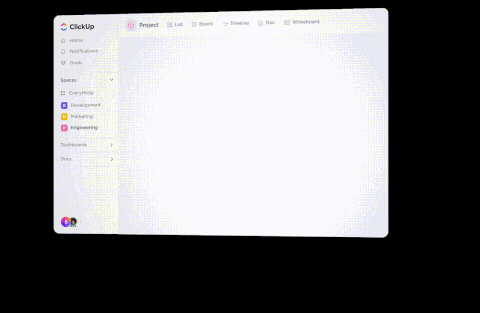
Tabs for tasks, lists, boards, timelines, docs, and whiteboards (Source: ClickUp)
Our Expert Opinion
ClickUp is an all-in-one project management solution that makes it easy to organize and grow your customer relationships using its tools for task tracking, data visualizations, and email. You can use it as an alternative to a CRM system by adding its CRM List template to your Workspace. It also allows you to create high-level views of your projects and drill down into tasks using filters and groups.
Google Workspace: Best CRM Competitor for Teams Using Google Apps

Pros
- All-in-one solution for email, data storage, file creation, video conferencing, and task management
- Applications are all easy to learn and use
- Robust integration options with other CRMs, project management, and marketing software
Cons
- No free plan
- Only spreadsheet views available for deals, contacts, and leads
- Does not have any reporting or analytics features
- Your organization uses Google apps for work management: Google Workspace is made up of a set of apps for managing your work. These apps include Gmail for email, Google Drive for strong and sharing files, Calendar for organizing events, and Tasks for creating and tracking activities.
- You are a hybrid remote team needing tools for real-time collaboration: Google Workspace allows your team members to co-edit in real time on Docs, Sheets, Slides, and Forms. You can also schedule a meeting via Team Calendar, hold Google Meet video conference calls, or converse using Team Chat.
- You are a freelancer needing a productivity and collaboration suite: Google Workspace has an Individual plan well-suited for single users managing a small business or consultancy. It offers unlimited video calls for meetings and professionally designed templates for email campaigns.
- You prefer using an all-in-one tool over a suite of various productivity and collaboration apps: Unlike all the other tools in this list, Google Workspace is a collection of several apps rather than a single program. However, you can easily access all of these apps from Gmail.
- Alternative: ClickUp is an all-in-one project management software that offers tools for managing tasks, dashboards, team collaboration, goals, and documents—all in one system.
Google Workspace Pricing Plan & Overview*
*Pricing is based on annual billing on a per user monthly breakdown. Monthly billing is available for a higher cost. Pricing is reflected at the time of this publication. We update pricing information regularly, but we encourage readers to check current pricing here.
Our Expert Opinion
If you directly compare capabilities to a CRM product, each Google app can be used for specific CRM modules. For instance, you would use Spreadsheets as a CRM for tracking contact and pipeline information. Docs, Forms, Slides, and Sites can be used to design and manage files, content, and your website. Drive is where you organize and share files, while Meet and Chat let you communicate through video calls or live chat.
Pro tip:
Are you a Google Workspace user who’s ready to invest in a CRM? Check out the top seven CRMs for Google users.
Smartsheet: Best Work Management Tool With Spreadsheet Interface

Pros
- Offers a free plan for a single user
- Highly customizable template for different project categories
- Has powerful reporting and analytics tools
Cons
- Steep learning curve and complex interface
- Time tracking and resource management tools cost extra
- Pages don’t update or autosave in real time
- You’re looking for a free CRM alternative for individual users: Smartsheet offers a free option for a single user and two editors. This edition comes with sheets for task and project management and multiple project views, as well as dashboards and reports.
- You need a highly customizable tool for managing your unique work process: With Smartsheet, you can use spreadsheets for a variety of purposes, including project management, inventory management, campaign tracking, and budget tracking. You can also choose from more than 300 project templates and customize them according to your needs.
- You are a team leader needing advanced reporting and analytics tools: Smartsheet allows you to consolidate crucial information from multiple sheets into one report with just a few clicks. It also lets you see who’s accessing your reports and updates in real time when changes are made to the attached sheets.
- Your team members don’t have a lot of technical skill: Smartsheet comes with a steep learning curve because of its complex interface and high customization capabilities.
- Alternative: Trello is our top recommendation for teams and organizations looking for an alternative to a simple CRM with little to no learning curve.
- Time and expense tracking features are crucial to your business: Smartsheet does not have built-in time tracking tools, but offers this feature under its Resource Management add-on. Contact the provider to obtain a quote for this product.
- Alternative: Wrike offers resource management and time tracking tools starting with its Business plan. It allows your team to automatically log their worked hours and generate timesheets.
Smartsheet Pricing Plan & Overview*
*Pricing is based on annual billing on a per-user monthly breakdown. Monthly billing is available for a higher cost. Pricing is reflected at the time of this publication. We update pricing information regularly, but we encourage readers to check current pricing here.
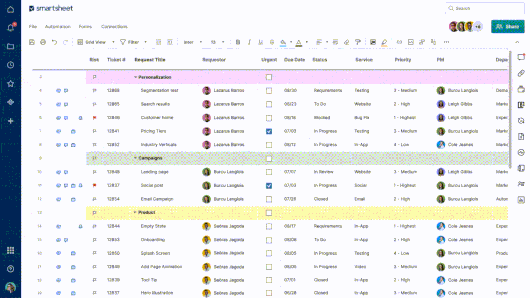
Overview of Smartsheet’s core features (Source: Smartsheet)
Our Expert Opinion
Smartsheet’s prebuilt templates gives sales teams and organizations the ability to manage customer data and track sales opportunities. It is spreadsheet software, a productivity tool, and a project management platform rolled into one system. You can use it to collaborate and communicate with your team, as well as automate repetitive tasks using advanced workflows.
Airtable: Great Marketing Capabilities

Pros
- Built-in drag-and-drop interface application designer
- Includes premade CRM templates
- Solid marketing capabilities through integrations and product extensions
Cons
- Limited integrations allowed until subscribing to the Enterprise plan
- Only five users allowed on the Free plan
- Board permission management requires the Pro or Enterprise plan
- You need a free CRM alternative for your sales team: Airtable has a free plan that supports five users and unlimited databases with tables and views. You can use its sales CRM template to manage accounts, customers, and deal progress.
- You are a marketing team needing a tool to track campaigns: Airtable has a template for monitoring the performance of your marketing campaigns, returns on investment (ROI), and campaign expenses.
- You’re looking for a highly customizable tracker for your unique work process: Airtable offers a wide variety of templates you can customize for your business needs. These include a content calendar template for publishing, social media calendar template for social post monitoring, and a user research plan template for gathering product feedback.
- You need a comprehensive project management tool: While you can create a spreadsheet grid for assigning tasks in Airtable, it does not have a built-in feature for this. If you regularly assign tasks and subtasks to your team, doing this manually can become tedious.
- Alternative: ClickUp allows you to simplify complex projects by breaking them into subtasks. You can also visualize tasks and subtasks using multiple view options and arrange or edit them in bulk with its Bulk Action Toolbar.
- You are a remote hybrid team looking for a variety of ways to collaborate: With Airtable, you can only collaborate with your team members using comments. While this is good for sharing feedback, it is not sufficient for complex discussions.
- Alternative: Google Workspace provides users with several options for collaboration. Aside from real-time editing access to files and documents, it also offers tools for team chat, calendar sharing, and video conferencing.
Airtable Pricing Plan & Overview*
*Pricing is based on annual billing on a per-user monthly breakdown. Monthly billing is available for a higher cost. Pricing is reflected at the time of this publication. We update pricing information regularly, but we encourage readers to check current pricing here.
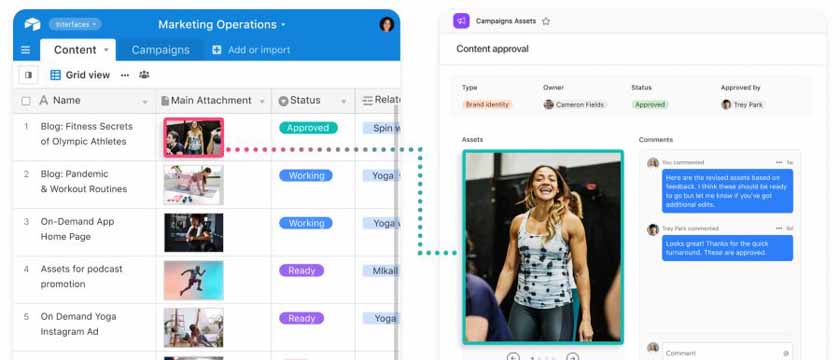
Interface Designer (Source: Airtable)
Our Expert Opinion
Airtable can be used as a CRM by customizing spreadsheet rows, otherwise known as records, into lead and customer profiles with pipeline statuses. Some automation capabilities and extensions for marketing activities make it a great CRM alternative—especially for popular marketing CRM tools like HubSpot. There are also record management, workflow automations, and document storage features similar to a CRM.
Wrike: Top CRM Alternative With Time Tracking

Pros
- Offers a free plan that supports unlimited users
- Powerful proofing tool for multiple file formats
- Has customizable project templates
Cons
- Paid plans can be expensive for individual users and small teams
- Lacks tools for team chat and video calling
- Time tracking is only available from the Business plan and up
- You are a solo user looking for a free CRM alternative: Wrike has a free plan that supports an unlimited number of users and projects. It comes with different task views for visualization of your project timeline and plan, as well as email integration.
- You need a highly customizable project management tool: Wrike has specialized and customizable project templates for various types of teams and users. These include marketers, creative teams, product managers, and professional service providers.
- You use chat and video calls for team collaboration: Wrike does not have in-app features for team chat and video conferencing.
- Alternative: Google Workspace is an excellent alternative because it offers a wide range of team collaboration tools. It has Team Chat for live chat and Google Meet for video calls.
- You’re looking for a user-friendly tool for beginner-level users: While Wrike has a comprehensive knowledge base you can use as a guide, it can be difficult to adapt to because of its heavy set of features.
- Alternative: Trello and Google Workspace are among the easiest to learn and use in this guide. They both have simple and highly intuitive interfaces ideal even for beginners.
Wrike Pricing Plan & Overview*
*Pricing is based on annual billing on a per-user monthly breakdown. Monthly billing is available for a higher cost. Pricing is reflected at the time of this publication. We update pricing information regularly, but we encourage readers to check current pricing here.
Our Expert Opinion
You can use Wrike as a simple CRM by adding customer records as Folders, which function as projects you can share and assign to your team or another department. You can also add linked tasks and files, add subfolders to function as subtasks, and customize work views. Its timeline view provides you with a dynamic Gantt chart that displays upcoming tasks, and its dashboard contains interactive widgets that you can customize via a drag-and-drop format.
Profit.co: Ideal for Objectives & Key Results (OKR) Tracking
Pros
- Offers a free plan for up to five users
- Objectives and Key Results (OKR) management features allow for easier monitoring of individual agents and entire teams
- Employee engagement tools include survey builder, leaderboard, and rewards
Cons
- Steep learning curve due to micro features and functionalities
- No subtasks and dashboards under the free plan
- Lacks tools for live chat and video calling
- You’re looking for a CRM alternative with comprehensive goal tracking features: Profit.co is known for its OKR management feature, which helps businesses prioritize goals and performance. It also helps your team align with your company’s overarching goal and understand how they contribute to it.
- You need a free CRM alternative with basic tools for task management and collaboration: Profit.co offers a free plan for up to five users. Under this tier, you can create workspaces and task boards that allow you to organize and track tasks for your team or department. You can also share comments and suggestions, as well as attach files to your conversations.
- You prefer a simple CRM alternative for beginner-level users: Profit.co comes with a rather steep learning curve because of the complexity and depth of its features and customization options.
- Alternative: Trello has easy-to-use, drag-and-drop Kanban boards for monitoring linear tasks and workflows. Pipefy also features a similarly intuitive interface that is easy for beginners to learn and use.
- You need live chat and video calling features for real-time collaboration: Profit.co’s collaboration tools are limited to mentions, tags, and suggestions.
- Alternative: Google Workspace comes with a rich set of tools for real-time employee engagement and collaboration. These include team chat, video calling, and live editing of files and documents.
Profit.co Pricing Plan & Overview*
*Pricing is based on annual billing on a per user, per month breakdown. Monthly billing is also available for a higher cost. Pricing is reflected at the time of this publication. We update pricing information regularly, but we encourage readers to check current pricing here.
Our Expert Opinion
Profit.co’s OKR management features are useful for keeping employees aligned with the company’s goals and objectives. You can also use its task management feature and workspaces to assign deals and opportunities to your team members and track their progress. Its board stages and checklists help you implement a predefined workflow for your team. Lastly, you can associate tasks with key results for easier monitoring of goals and assignments.
Pipefy: Good Business Process Automation Tool
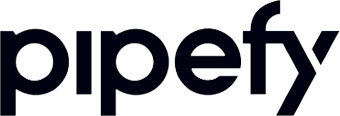
Pros
- Offers a free plan for up to 10 users
- Has email automation with easy-to-build templates
- No-code workflow management tools
Cons
- Reports are limited to standard productivity and lead time metrics
- No videos or pictures included in setup guides
- Does not offer phone support
- You’re a small sales team looking for a free CRM alternative: Pipefy offers a free plan for up to 10 users. This comes with workflows, process and email templates, basic reporting tools, and mobile apps.
- You need a simple business process automation (BPA) tool: Pipefy has a low-code workflow automation kit with drag-and-drop customization capabilities. This makes it very easy for non-technical users to create automated processes. It also offers several types of process templates, including those for human resources (HR), customer service, sales, marketing, and information technology (IT).
- You’re looking for CRM alternatives with more affordable paid options: While Pipefy has a free option suited for teams with 10 members, this has limited features and storage space. Its paid plans start at $19 per user, monthly, which could be a bit pricey for small businesses with limited budgets.
- Alternative: ClickUp’s paid plan starts at $5 per user, monthly. This includes unlimited tasks, storage, integrations, dashboards, Gantt charts, and custom fields.
Pipefy Pricing Plan & Overview*
*Pricing is based on annual billing on a per-user monthly breakdown. Monthly billing is available for a higher cost. Pricing is reflected at the time of this publication. We update pricing information regularly, but we encourage readers to check current pricing here.
Our Expert Opinion
Pipefy offers various process templates for different types of industries, such as sales, HR, finance, and IT. You can customize these templates according to your own business workflows and keep track of your team’s activities, deal progress, and opportunities from the dashboard. Its low-code automation capabilities helps organizations save time by automating time-consuming processes, such as lead qualification and sales onboarding.
ProofHub: Top Project Resource Management Software

Pros
- Offers a flat pricing scheme for unlimited users
- Has an option for white labeling
- All plans include time tracking features
Cons
- No free plan
- Does not offer function for recurring tasks
- Limited third-party integrations
- You are a team manager who needs to track work time for tasks and projects: ProofHub offers time tracking tools with both of its plans. You can add timesheets, set time estimates, create time reports, and track time either manually or using a timer.
- You are a startup needing an all-in-one tool for task management and collaboration: Startups thrive on extensive collaboration, which ProofHub offers in the form of team chat and discussion topics. Its Essential plan also supports an unlimited number of users and includes core features for managing projects, tasks, calendars, and files.
- You’re looking for a CRM alternative with robust integration options: ProofHub offers native integration with less than 10 apps, including Slack, Dropbox, and QuickBooks.
- Alternative: With ClickUp, you can connect with more than 1,000 third-party apps for free.
ProofHub Pricing Plan & Overview*
*Pricing is based on annual billing on a per month breakdown. Monthly billing is available for a higher cost. Pricing is reflected at the time of this publication. We update pricing information regularly, but we encourage readers to check current pricing here.
Our Expert Opinion
ProofHub is an ideal solution for sales teams and project managers looking for an all-in-one tool for managing projects and collaborating with team members. You can use its project templates to streamline your processes for sales, lead scoring, customer onboarding, and sharing customer data.
Why Use a CRM Alternative?
Popular CRM software tools offer relative value in that each product or solution will be better suited for specific businesses based on their modular needs, budget, and usability requirements. Substituting a traditional software product with a CRM alternative benefits certain businesses for various reasons. Here’s why some firms might pursue alternative CRM solutions:
- The firm is a solo-operated business: Much of the value of a CRM stems from the ability to collaborate with team members and keep each other up to date on current opportunities. Solopreneurs don’t need those features as they work alone and may prefer a simpler solution.
- Business has budgetary constraints: Small or startup businesses are often on a tight budget. Therefore, using a software tool with free and low-cost subscription options they can customize into a CRM may be a more practical route. For those on a tight budget but who would like a traditional CRM system, check out our picks for the best free CRM software tools.
- Users prioritize product ease of use: Because many of these alternative products use spreadsheet-style formats, it’s easier to add and update lead and customer records than traditional CRMs. Plus, many business owners have never used a CRM before but have experience with project management tools—making it a suitable option for managing sales.
- The team only needs minimal functionality: Some businesses have a simplistic sales operation where all they want to do is track their pipelines and contact data. Using project management or productivity software is an easy solution to basic CRM functionality—especially if your team doesn’t need advanced analytics, automation, or artificial intelligence (AI) features.
Pro tip:
If your team is growing and your business is scaling, you may be ready to invest in a robust CRM platform. Read our expert guide on the best small business CRMs to explore our top recommendations.
How We Evaluated the Top CRM Competitors
To determine the best CRM alternative, we considered purpose-built platforms for managing contacts and administrative projects. The products we chose offer tools for modifying and automating business processes, as well as tools for managing and assigning tasks. Additionally, we looked at other essential product attributes, such as features, pricing, customer support availability, and user reviews.
The tabs below offer insight into our evaluation process for CRM competitors:
35% of Overall Score
Other than ease of use, pricing was the top criterion evaluated for each product. We considered free plan availability and various scalable pricing options businesses could afford as they grow. We also looked at the availability for a subscriber to either pay monthly or save by paying annually.
35% of Overall Score
We looked at overall features crucial to a CRM alternative, regardless of its primary use case or usability ratings. For instance, we wanted to see if each product had capabilities essential to any sales operation, including customizable pipelines, reporting and analytics tools, and an extensive range of third-party and native integration options. We also checked if the provider offers an easy-to-use mobile application for on-the-go sales.
10% of Overall Score
Extensive support and service are necessary to help prevent poor experiences users may encounter while using any of these CRM alternatives. This category was evaluated in terms of customer service hours and the availability of support via phone, live chat, and email. We also looked at self-service and help center resources users can access, like tutorials, forums, or training modules.
20% of Overall Score
In addition to firsthand experience with these CRM competitors, we evaluated what actual users say about each product according to online reviews. These criteria consider how customers feel in terms of product ease of use. It also provides insights into customer feelings regarding value for the price paid and how useful they find the platform’s features.
Bottom Line
CRM options are project management and productivity software tailored to be a substitute for a traditional CRM product like Salesforce. The minimal sales features, ease of use, and low-cost subscription options make these platforms solid replacements for investing in a full-scale CRM. Each product, while an alternative, is better suited for specific businesses based on their modular and budgetary needs.
